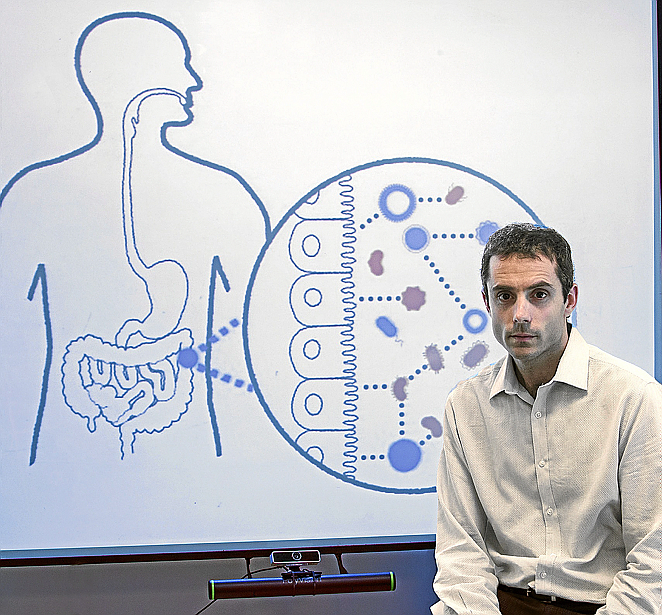“The current immigration system doesn’t just let this talent get away, if actually forces it to leave the country after graduation. It simply makes no sense.”
Bernat Olle hopes to revolutionize healthcare through a technology that allows microbes to be used as medicine. The Spanish native is the CEO and co-founder of Vedanta Biosciences, a Cambridge-based company that is developing technology that will use bacteria to treat various immune system diseases. Olle argues that the current US immigration system is an obstacle for companies like his, which want to hire top talent from around the world.
Spanish native Bernat Olle hopes to revolutionize healthcare by using microbes as medicine. Olle is the CEO and co-founder of Vedanta Biosciences, a Cambridge-based company whose technology alters how the trillions of microbes in our body interact with our immune system. “It’s a completely new way to approach medicine,” Olle says, and it could help treat conditions ranging from allergies to diabetes.
Olle came to the United States to pursue an MBA and a PhD in Chemical Engineering at MIT, but never intended to start his own business. “I don’t come from a family of entrepreneurs,” he says, “and growing up, I wouldn’t have been able to name a single entrepreneur.” This changed with his arrival at MIT where, through his immersion in the school’s highly entrepreneurial environment, Olle fell in love with the idea of starting his own company. “A lot of my friends were founding companies,” Olle says, “and I started thinking that if they could do it, there was no reason I couldn’t too.”
And start companies he did. In the last decade, Olle has co-founded four companies and, in 2013, he was named Spain’s “Innovator of the Year” by the MIT Technology Review in its “Innovators Under 35” List. Each of Olle’s companies is developing a solution for a health problem, including balding and obesity, but Vedanta Biosciences may be one of the most consequential. “We think the microbiome field will eventually revolutionize medicine,” Olle says.
The rapidly growing Vedanta team is a diverse one, with employees hailing from the United States, Canada, Spain, the Netherlands, Japan, Colombia, India, and Peru. Not surprisingly, Olle argues that for the United States to remain competitive in the global economy, it must attract—and retain—top talent from around the world. “But the current immigration system makes this very difficult,” Olle says.
Although his own journey from a J-1 visa (for international research scholars) to a green card was relatively simple, he knows this is not typical. “I know many talented people—friends and colleagues—who have had to leave the country because they couldn’t get visas,” Olle says. The obstacles preventing talented international students from remaining in the United States are particularly detrimental, Olle argues. “We’re talking about some of the best prepared young people in the world, who are educated in the United States, and poised to become incredible entrepreneurs,” he says, “The current immigration system doesn’t just let this talent get away, if actually forces it to leave the country after graduation. It simply makes no sense.”
